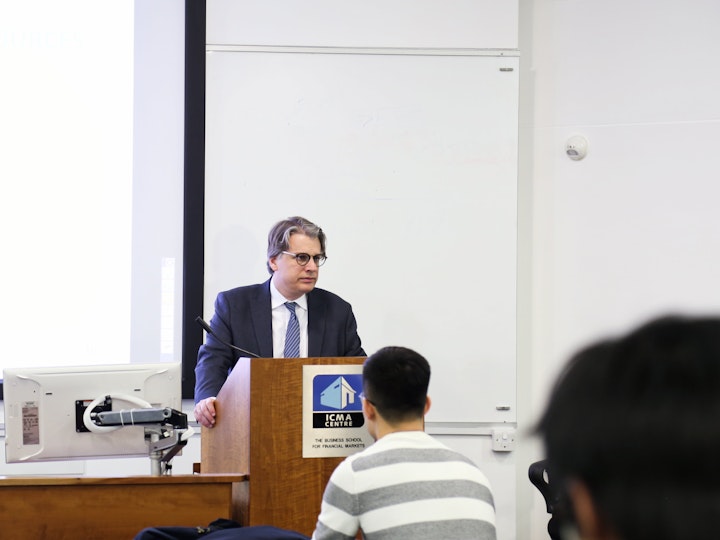Industry Insights: Konstantinos Maratos, UBP - Wealth Management
This week’s Industry Insight's event was delivered by Mr. Konstantinos Maratos and organised by the ICMA Centre in partnership with the University of Reading Finance Society.


During an insightful and interactive talk, Mr. Maratos discussed the growing demand for wealth management services, what makes a private banker successful, client interaction processes, as well as the future trends of the industry.
Mr. Maratos read Economics and Politics at Queen Mary University of London, holds a Master’s degree in Financial Management from the University of London, and is CFA certified. He currently is a Senior Wealth Manager at Union Bancaire Privée – a Private Banking & Wealth Management firm headquartered in Geneva with over 126 billion CHF of assets under management. He also teaches Wealth Management and Portfolio Construction to Postgraduate students at King’s College London. Prior to joining the Swiss family owned firm, Mr. Maratos held roles at Barclays Wealth and Investment Management.
Starting off the talk, Mr. Maratos linked the growing demand for Wealth Managers to an increase in the number High Net Worth Individuals (HNWI) and growing complexity of the financial markets. Following this, he described that different Private Wealth Management firms take on a different amount of minimum investment depending on the size of the company, with increasingly large minimum investment amounts being the current general trend due to increasing costs of regulatory requirements.
The talk then covered what makes a Private Wealth Manager successful and emphasised the importance of interpersonal skills and service tailoring as a decisive criterion to clients.
Moreover, Mr. Maratos highlighted the influence of referrals and fostering long-term relationships for building trust, which will subsequently build you a lucrative book of clients and a successful career in Wealth Management.
He also added that another key to building this trust is having a perfect knowledge of all the different financial instruments present in your client’s portfolio.
Mr. Maratos accentuated the importance of knowing your client from multiple perspectives, including: personal, financial, investment objectives, risk tolerance, and time horizon. Even if one of his quotes about Wealth Management was ‘’If you’re making money don’t worry’’, he followed by talking about how reviewing your client’s portfolio on a daily basis is crucial to stay a step ahead over any market changes or events.
Finally, the presentation finished with Mr. Maratos providing details about the worldwide wealth management hubs, including Luxembourg, Monaco, and Switzerland, and how the financial stability of these places makes them safe havens for money managers. Mr. Maratos then followed by explaining that one of the major trends within the industry are increasing costs, as well as clients preferring more holistic advisory solutions.
The Q&A session was very engaging with questions spanning from the most relevant qualifications to be successful in Wealth Management to tailoring each portfolio to the individual client. Many students were also interested in what Private Wealth Management firms look for in graduates. Mr. Maratos emphasised that the candidate’s overall attitude was the decisive criterion, and that willingness to learn trumped trying to be a know it all.
The ICMA Centre and the University of Reading Finance Society thank Mr. Konstantinos Maratos for a fantastic talk!
Max Herblin, Business Administration and Management undergraduate and member of the Finance Society

